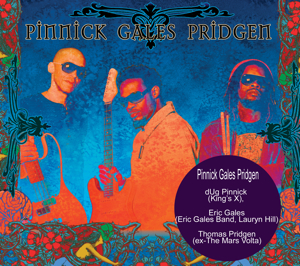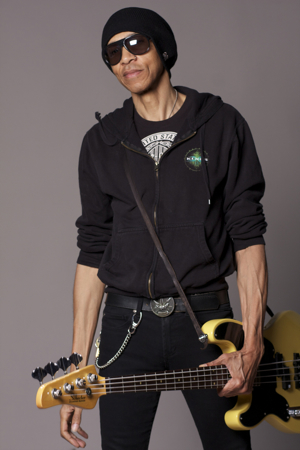By Andrew Bansal
 Known for his work in progressive rock band King’s X, solo albums as well as guest appearances with a multitude of other artists and bands over the past two decades, legendary bassist/vocalist Dug Pinnick of King’s X has now started a new project with blues rock solo artist Eric Gales on guitar and Thomas Pridgen of The Mars Volta fame on the drums. Their self-titled debut album is set to release on February 12th via Magna Carta Records. A couple of days ago, I had the absolute pleasure of talking to Dug about this album, his solo material, gear and other things. Enjoy the chat below, and visit the PGP’s artist page on Magna Carta here.
Known for his work in progressive rock band King’s X, solo albums as well as guest appearances with a multitude of other artists and bands over the past two decades, legendary bassist/vocalist Dug Pinnick of King’s X has now started a new project with blues rock solo artist Eric Gales on guitar and Thomas Pridgen of The Mars Volta fame on the drums. Their self-titled debut album is set to release on February 12th via Magna Carta Records. A couple of days ago, I had the absolute pleasure of talking to Dug about this album, his solo material, gear and other things. Enjoy the chat below, and visit the PGP’s artist page on Magna Carta here.
I was just listening to the Pinnick Gales Pridgen album, and I must say that all tunes are sounding pretty impressive so far. First of all, tell me how this collaboration came about.
Well, Mike Varney from Magna Carta called me up and asked whether I’d be interested in doing a project with Thomas and Eric, and I said yes. So he put the studio up in the north of San Francisco, we went up there for ten days and did the record!
Would you call this a mix of the influences and styles brought on by the three members?
Yeah, I think everybody put their own part into this, and I think it came out in an interesting way. It doesn’t sound like either King’s X or Eric Gales or The Mars Volta. It sounds like a good rock band, I think.
What’s your aim with this? Is it going to be just a studio project or are you planning to play shows as well?
I know that we will play some shows. We haven’t really discussed it or worked out the details yet, but we’re going to do some shows. We need to do that and put the record out. We’re also going to do another album after this one’s out, may be in a few months.
That’s great to hear! As you said, the music doesn’t sound exactly like any of the bands that the members are in. But do you think it will find appreciation among King’s X fans?
I don’t know, but I know that every time I post this music on facebook, people get really, really excited. But I just can’t say until the record comes out. We’ll see if people like it!
While you guys were working on this album, were there any conflicts of ideas or personalities at all?
Oh no, not at all. It took us just ten days to do the record and three days to do the drum tracks! I brought five songs in personally myself, and then we jammed on two songs. We wrote one song together, and Mike Varney came in and wrote two more songs. That’s how we got all the songs together.
That’s great. Talking of your solo career, you haven’t put out a solo album since 2007. This release is more of a band effort. Do you have plans for putting out any new solo material any time soon?
Yes! My new album is done and it’s going to come out next month. I’ll send you a copy. I want you to hear it!
Oh, awesome! Looking forward to that. So, you’ll be at NAMM this week. Are you going to introducing any new products or are you just meeting people over there as usual?
I’ll be meeting people, and I think I’m doing signings at Schecter and Ampeg, and I’m going to sing at the Sabian Live show that we’re playing on Friday night, with Ray Luzier from Korn on drums, George Lynch on guitar and Billy Sheehan on bass. George Lynch, Ray Luzier and I are in another band, we’re called KXM. We’re in the studio making a record, and we’ll be releasing more details about that soon.
It seems like you’re constantly busy, which is great. Talking of your gear, you’ve been known for using a 12-string bass. For people who don’t know this, can you tell me why and when you started using it?
Tom Petersson of Cheap Trick plays a 12-string. Him and Jol Dantzig of Hamer Guitars started making 12-strings back in the 70s. Tom Petersson ended up playing exclusively 12 strings for the last 30 years, and King’s X was touring with Cheap Trick in 1989. Tom handed me his bass and said, ‘Check it out!’ I really, really loved it. So I got a hold of Hamer and they started making 12-string basses for me. I used it a lot in the early days, but I really don’t use it very much anymore. It’s just a regular 4-string bass now with two extra strings that go to each octave so that it’s three strings to one note when you press three strings down. It’s an interesting animal. Sometimes it’s hard to play, and I haven’t been using it a lot lately actually.
Yeah, that’s what I was about to ask you. Does it get physically challenging to play such basses?
Well, it’s not as much challenging as, I just hadn’t found it’s place, you know, in terms of what we need to do with it in the band, because Ty Tabor’s guitar is so big and the way he plays, sometimes the 12 string sort of makes it more of a mess. A lot of people think that I’m using a 12 string all the time but my 4-string sounds like 12, sometimes, and it fools me. On the Dogman record, I did not use the 12-string at all and everybody thinks I did.
 That’s interesting. I was also checking out some photos of your rig which are posted on this website 12stringbass.net. They mentioned that you used the guitar model of the Line 6 POD Pro. Why did you not use the bass model for that?
That’s interesting. I was also checking out some photos of your rig which are posted on this website 12stringbass.net. They mentioned that you used the guitar model of the Line 6 POD Pro. Why did you not use the bass model for that?
I don’t use a POD anymore. I moved on to Egnator and then I moved on to Orlando, and now I’m on Fractal Axe FX. But the reason I use the guitar amps is to give the high end for my bass and then I use Ampeg pre-amps for the low end. I run them together to get that sound. But the Axe FX is a computer-based pre-amp. It has all the sounds and all the effects I need. So I program my rig inside this little computer and I just carry it around, and I get the exact same sound.
Yeah, a lot of musicians these days are using Fractal. It has clearly made a big difference in terms of live musicianship.
It makes it easier to get your sound, because you don’t have to drag a whole lot of pedals and a whole lot of amps to get the sound that you want. With so many amps built in to the Axe FX, it works. It sounds real, and it feels that way. It’s a great invention (laughs).
Finally I’d like to ask you; you’re 62 years old now which is hard to believe because nobody can tell that upon listening to your records or watching you perform. Over the years, what’s been physically harder for you, singing or playing bass?
Singing, because singing is a muscle thing. I’ve used my voice so much that it’s not as agile as it used to be when I was younger. But I still love to sing and it’s a lot of fun. I just have to work a little bit harder at it. As for playing bass, that’s something I just love to do and it’s never been a problem.
